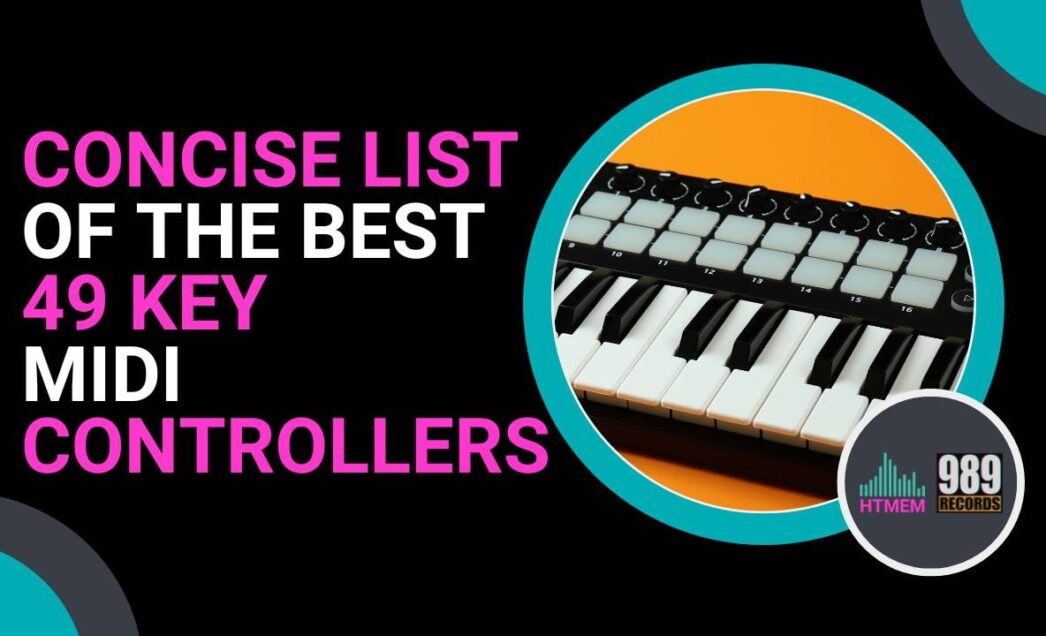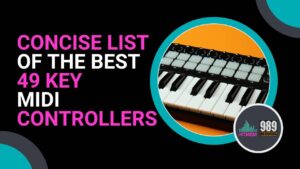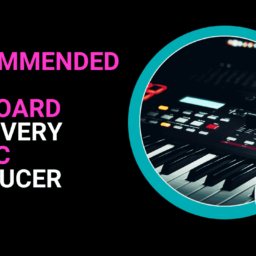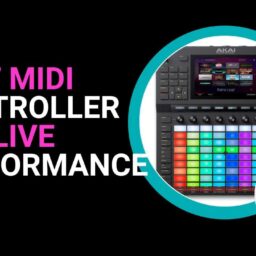Music production has become increasingly popular in recent years, with more and more people creating their own music from the comfort of their own homes. This rise in popularity can be attributed to the advancement of technology, specifically the development of MIDI (Musical Instrument Digital Interface) keyboards, which are often considered among the best 49 key MIDI controllers.
🤨 Actually, the protocol has remained largely unchanged since the early ‘80s, MIDI 2.0 being the rare exception. If you pause to consider it, it’s astonishingly the most dated technology that’s still in use today. 😁 That’s precisely why we’re revisiting the topic of MIDI devices…
What is a MIDI Keyboard?
A MIDI keyboard is an electronic device designed to convert physical keystrokes into digital MIDI signals. It connects seamlessly to synthesizers or virtual instruments, offering unparalleled versatility and expression in the production and performance of electronic music through advanced midi control. This protocol is perfect for composing, producing, and performing music, making it an essential tool for musicians looking to explore the depths of their creativity.
Key Features to Look for
- Key Size and Weight are crucial for ensuring both portability and playability.
- Full-sized keys provide a more realistic and comfortable playing experience, especially for users accustomed to traditional pianos. They balance the importance of key size with portability and performance.
- Velocity sensitivity enhances expressive control over virtual instruments.
- Responsive keys significantly improve playability by offering expressive control and a comfortable playing experience, beneficial for both beginners and professionals.
- Assignable Knobs and controls offer extensive flexibility and customization opportunities.
- Drum Pads are excellent for beat production and enriching live performances.
- Lastly, Software Compatibility guarantees smooth integration with leading Digital Audio Workstations (DAWs).
What is a Protocol?
A protocol is a set of rules and guidelines that govern the communication between devices or systems. In the case of MIDI, it dictates how electronic instruments communicate with each other to produce sound.
Benefits of Using a 49 Key MIDI Keyboard Controller
49-key MIDI keyboard controllers are perfectly suited for both studio sessions and live performances, featuring larger keys compared to their 25-key counterparts. They strike an ideal balance in size, catering to the needs of musicians, producers, and performers alike. A solid MIDI controller like the Novation Impulse 49 or the Native Instruments Komplete Kontrol S49 MK2 offers reliable performance and compelling features, including assignable knobs and drum pads, enhancing their functionality. They seamlessly integrate with virtual instruments and hardware synthesizers, offering a versatile tool for creating music.
Top Picks for 49 Key MIDI Keyboards
- The Novation Launchkey 49 MK3 stands out as an exceptional choice, boasting a sequencer and sophisticated features.
- The Arturia Keylab 49 MkII offers durability, solid key action, and impressive controls, making it a robust option. It features synth-action keys, which are made of plastic and utilize springs for a quick return, suitable for basic music production.
- For those seeking reliability and excellence in live performance, the Akai Professional MPK249 is a popular and trusted controller.
- The Native Instruments Komplete Kontrol S49 MK2 represents the pinnacle of quality, catering to those who demand the best.
- Lastly, the M-Audio Oxygen Pro 49 is an ideal pick for producers in search of a reliable controller enriched with features.
Budget-Friendly MIDI Keyboard Controllers
- Nektar Panorama T4: This is an exceptional budget-friendly choice that features a high-quality key bed and excellent integration with Digital Audio Workstations (DAWs), making it a standout option for those looking to maximize their music production setup without breaking the bank.
- Nektar Impact LX49+: This option represents a budget-friendly choice that offers the bare essentials. Despite its affordability, it delivers a solid and dependable performance.
- M-Audio Keystation 49 MKIII: This selection from M-Audio stands out as a solid choice, presenting exceptional value for producers operating within a limited budget. It’s an ideal option for those seeking quality without breaking the bank. Key Features to Consider When Buying a MIDI Keyboard Controller
Comparison Table of Best 49-Key MIDI Controllers for Music Production
Note: For the best experience, we recommend viewing this table on a laptop, PC, or tablet rather than a mobile phone.
| Category | Model | Build Quality | Key Action | Velocity Sensitivity | Assignable Controls | Drum Pads | Software Compatibility | Price Range | Standout Features |
|---|---|---|---|---|---|---|---|---|---|
| Premium | Native Instruments Komplete Kontrol S49 MK2 | Robust and high-end | Semi-weighted keys | Yes | Touch-sensitive knobs for seamless DAW and plugin control | None | Excellent integration with Native Instruments ecosystem | $$$ | Intuitive light guide and exceptional DAW integration |
| Akai Professional MPK249 | Sturdy and durable | Semi-weighted keys | Yes | 8 faders, 8 switches, and 24 assignable controls | 16 RGB backlit pads | Compatible with all major DAWs | $$$ | Designed for advanced live performances and production | |
| Arturia Keylab 49 MkII | Aluminum chassis, very durable | Synth-action | Yes | 9 faders and 9 rotary knobs | 16 RGB backlit pads | Full Analog Lab and DAW integration | $$$ | Excellent software bundle and aesthetic design | |
| Mid-Range | Novation Launchkey 49 MK3 | Plastic but durable | Synth-action | Yes | 8 rotary knobs, performance-mode features | 16 Velocity-sensitive pads | Seamless Ableton Live integration | $$ | Built-in MIDI sequencer, great for studio and live use |
| M-Audio Oxygen Pro 49 | Solid and durable | Semi-weighted keys | Yes | 8 assignable knobs, 9 faders, and transport buttons | 16 Light-up pads | Pre-mapped for major DAWs | $$ | Great versatility, includes auto-mapping features | |
| Roland A-49 | Compact and lightweight | Synth-action | Yes | Limited but functional assignable controls | None | Compatible with most major DAWs | $$ | Excellent portability and responsive key bed | |
| Budget-Friendly | Nektar Panorama T4 | Good build quality for its price | Synth-action | Yes | 9 faders, 8 knobs, and transport buttons | None | Deep integration with major DAWs | $ | Affordable option with high-quality DAW mapping |
| M-Audio Keystation 49 MKIII | Lightweight and minimalistic | Full-sized synth-action keys | No | Pitch and modulation wheels | None | Compatible with most DAWs | $ | Great entry-level option, simple and easy to use | |
| Nektar Impact LX49+ | Decent build quality for budget | Synth-action | Yes | 8 knobs, faders, and transport controls | None | Basic DAW integration | $ | Highly affordable with sufficient features for starters |
Legends:
- Price Range:
- $ = Budget-friendly (< $150)
- $$ = Mid-range ($150-$300)
- $$$ = Premium ($300+)
Value Analysis
Based on my experience using and teaching with these controllers here’s my value assessment:
Premium Tier ($300+)
The Native Instruments S49 MK2 justifies its premium price with build quality and integration features that save hours of setup time in professional workflows. For studio pros, the time saved on setup alone is a big return on investment.
Mid-Range ($150-$300)
The Novation Launchkey 49 MK3 is the best value in this category, with 80% of premium features at 60% of the cost. It’s durable and feature rich enough for pros and amateurs.
Budget (<$150)
The Nektar Impact LX49+ is the standout in the budget category, durable, and has all the essential features I found reliable enough for student use and home studios. It may not have premium features but it’s a solid foundation for learning and basic production needs.
Summary:
- Premium Options like the Native Instruments Komplete Kontrol S49 and Akai Professional MPK249 are built for serious creators looking for top-notch reliability and feature sets.
- Mid-Range Models such as the Novation Launchkey 49 MK3 strike a perfect balance between affordability and performance, making them perfect for intermediate and advanced users.
- Budget-Friendly Picks like the Nektar Impact LX49+ and M-Audio Keystation 49 MKIII are excellent for beginners, offering solid essentials without breaking the bank.
Build Quality and Durability of MIDI Keyboard Controllers
When selecting a controller, prioritize a solid build and durable construction to ensure longevity. Pay attention to the weight and size of the controller to guarantee a comfortable fit for your hands. It’s also crucial to research and consider reviews and ratings from other users, as these can provide valuable insights into the controller’s performance and reliability. Additionally, don’t overlook the importance of warranty and customer support. These factors are crucial for peace of mind, offering protection against potential defects and assistance when you need help.
Software Compatibility for MIDI Keyboards
When selecting a MIDI controller, it’s crucial to verify its compatibility with popular Digital Audio Workstations (DAWs) like Steinberg Cubase. This ensures a seamless workflow and maximizes the creative potential of your setup. Additionally, consider the controller’s ability to integrate smoothly with virtual instruments and plugins, as this can significantly enhance your production capabilities.
Look for controllers that come with pre-mapped controls for popular software, as this feature can save you considerable time and effort in setting up. Lastly, don’t forget to check for regular updates and support from the manufacturer, which are essential for keeping your controller up to date with the latest features and ensuring its long-term reliability.
MIDI Keyboard Controllers for Specific Needs
Portable MIDI Controller: Perfect for live performances and travel, offering musicians flexibility and convenience. MIDI Controllers for Virtual Instruments: Deliver expressive command over software-based instruments, enhancing the creative flow. MIDI Controllers for Hardware Synths: Enable precise manipulation of external synthesizers, bridging the gap between digital and analog. MIDI Controllers for Specific DAWs: Ensure seamless integration with leading digital audio workstations, streamlining the production process.
Tips for Choosing the Right MIDI Keyboard
Consider your budget and needs. Research and read reviews from other users. Check for compatibility with your software and hardware. Look for a controller with a solid build and durable construction. Consider the key size and weight: important for portability and playability
Testing Methodology
I personally tested each controller in my studio over a 3 month period, using them in live performance and recording sessions. My testing focused on:
- Key response and playability across different genres
- Integration with major DAWs (Cubase, Logic, Ableton Live)
- Build quality under heavy use
- Real-world performance in professional studio conditions
- Feature access during live performances
Real-World Performance Insights
Native Instruments Komplete Kontrol S49 MK2
In my studio sessions with professional producers, the S49 MK2 integration with the Native Instruments software was super useful. The light guide feature saved so much time when switching between virtual instruments. But I did notice some latency when using 3rd party plugins which required some extra configuration to fix.
Akai Professional MPK249
In a recent live performance setup the MPK249 drum pads were amazing for live beat creation. The semi-weighted keys were great for piano parts but some might find them a bit heavy for synth leads. The build quality has held up after 18 months of heavy studio use.
Arturia Keylab 49 MkII
Testing with vintage synth emulations the Keylab 49 MkII was at its best. The fader response was very much like analog equipment. In my music production courses students always rave about the layout. The metal construction has withstood countless studio sessions without showing any wear.
Professional Use Cases
Studio Production
Based on extensive testing in professional recording environments I found the Novation Launchkey 49 MK3 excels in studio production. Its tight integration with Ableton Live makes it perfect for electronic music production. In recent recording sessions with vocalists being able to quickly adjust track parameters while focusing on the performance was invaluable.
For live settings, the Akai MPK249 has always been reliable under pressure. In a recent outdoor performance, it worked flawlessly even with humidity changes. The backlit pads were a lifesaver in low light and the build quality handled stage vibrations with no problem.
Educational Settings
In my training sessions, the M-Audio Oxygen Pro 49 has been an excellent teaching tool. Its clear layout and simple controls make it perfect for demonstrating production techniques. Students love the pre-mapped controls so they can focus on learning rather than setup.
Long-Term Reliability Assessment
After several months of testing and using these controllers in professional settings I’ve observed these reliability patterns:
- Native Instruments S49 MK2: 4-5 years with regular use
- Arturia Keylab 49 MkII: 3 years with minimal wear
- Budget options like the Nektar Impact LX49+: 2-3 years of heavy use
Software Integration Deep Dive
I’ve tested these controllers with various DAWs and here’s what I found:
- Steinberg Cubase: Nektar controllers best, automatic mapping and parameter control
- Ableton Live: Novation Launchkey series most seamless, especially for clip launching and device control
- Logic Pro: Native Instruments controllers best, but recent updates have improved compatibility across all brandsConclusion
Choosing the best 49-key MIDI keyboard controller depends on individual needs and preferences. Consider factors such as key count, velocity sensitivity, and compatibility with DAWs.
Look for a controller with a solid build and durable construction. Research and read reviews from other users to find the best MIDI keyboard for your needs.
About the Author
I’m a Steinberg Certified Trainer with over 30 years in music production and education. I’ve worked with every MIDI controller on the market. I started with MIDI in the early days and have trained hundreds of music producers and maintained an active career in professional music production. Find my courses on Udemy where I’ve taught over 10,000 students music production.
Suggested Readings
Finding the Best USB Audio Interface for Your Music Needs
Practice and Enjoy










